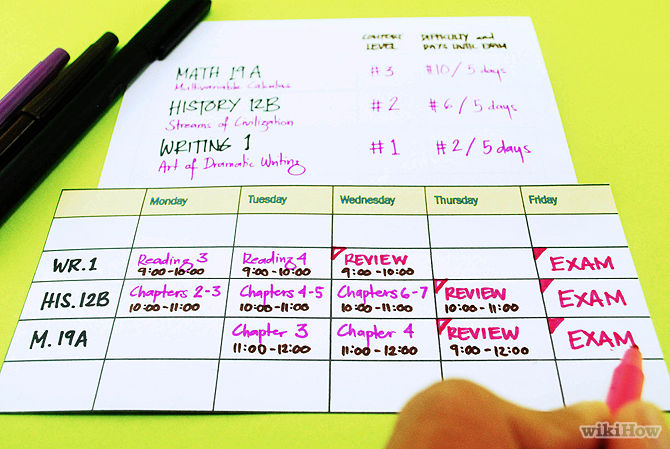
In less than 2 months, we will reach that dreaded time of the year… semester final exams. As I prepare the material to tutor my sister, all of which, I have to relearn as it’s been a long time since high school, I want to make sure that I’m able to help her study as best as possible.
Having tutored her and many other students in the past fifteen years, I learned a few ‘tricks of the trade’ on how to help them study… all of which have been successful!
If you are also preparing to help your children study for their tests, here are a few ideas on how to do it well:
1. Make learning fun
Studying is usually not exciting for children, especially after they are overwhelmed from a whole day at school and if they feel nervous about the upcoming test. To make it less of a burden, get them learning while having fun. Playing games like bingo, interactive games, Jeopardy and so on can get their adrenaline pumping while they are studying and enjoying themselves. Cram.com has fun, educational games with flash cards which make for a great learning tool. Flash cards have been my go-to learning system since I was a kid (I swear by them!). You can find other fun test review game ideas on this useful Pinterest board.

A game can make otherwise dreary studying a lot of fun!
(Image source: Cram)
2. Study the material yourself
In all likelihood, you haven’t really dealt with most of the school’s history, mathematics or science lessons, and terminology in a long time. When I was helping my sister with her biology homework, I realized quickly that my understanding of the subject was too limited to help her study. So, prior to every tutoring or study session, I took some time to read the chapters of her book on my own and look up anything I didn’t understand. This enabled me to explain the material to my sister in a way that she could conceptualize.

Get ready to study!!
(Image source: iosphere from freedigitalphotos.net)
3. Pre-plan and schedule enough time
Studying last minute before a test is no good. You don’t want your kids to memorize the material and not remember it again. There’s also so much you can review when you only study a day before an exam. Instead, plan it out so that the studying begins at the very least 2 weeks before the test. I actually start the process a month before so we can take our time lesson by lesson, we can review what was learned, and we can go over problems and questions. It’s also less tense for you both and you will have a calm, patient child rather than one dealing with last-minute panic.

A great guide to making a study schedule
(Image source: wikiHow)
4. Give rewards and positive reinforcement
Children need to be consistently pushed with positive reinforcement. As you move forward with the lesson, make them feel like they are progressing. Give them compliments, acknowledge their improvement and show them just how much they have advanced since you started. Personally, I don’t like to promise material rewards for good grades, but it can actually be an effective incentive to get them inspired and excited about studying and doing well.

Help your kids move forward with positive reinforcement!
(Image source: stock images from freedigitalphotos.net)
5. Watch out for frustration
While you provide the positive reinforcement, you also need to watch for signs of frustration, impatience or despair. No proper learning can happen while the child is upset during studying. If this happens, take a step back, analyze what is happening and give your child a break. Try to figure out a better or different way to explain the information that was causing the frustration. Sometimes you just need to sleep on it, as does the child.

Take a break when anxiety sets it.
(Image source: stock images from freedigitalphotos.net)
What tips do you have for helping your children study? Share below – we would love to hear them!
**Unedited featured image courtesy of Sicha Pongjivanich at FreeDigitalPhotos.net.





my son is a perfectionist so he often gets frustrated when he is doing a project too long. Just today I said we don’t have to finish book report today go outside.
All excellent tips. My oldest gets frustrated with his math sometimes and I tell him to take a break and go back later. That usually helps.
Thanks for these great tips. Studying is really hard, especially for kids. They’re brains aren’t wired to be so focused for so long.
These are great tips that bring back many nights of struggling through homework with my kids. I’m glad those days are over and we all survived!
GREAT tips! My daughter is in middle school and I will be putting these tips into action!
Amazing tips, I do almost all of these except for scheduling time. I’m horrible at that!
I feel like when my kids get their spelling words, I am studying for their test. I memorize their words, and go over them like everyday!
These are great tips! My daughter is only one and a half and this will definitely help me in the future when she actually attends school 🙂
These are great tools for teachers too. I find myself doing these steps all the time to keep my students entertained. – Katy
As a homeschooling mom, I strive every day to make learning fun. Kids don’t want to do it if there isn’t an element of fun to it.
I think making learning fun always works best. That’s how I get my daughter to learn things she is struggling to learn.
Thanks for the awesome tips! I don’t have kids yet, but when I do I’ll definitely be referring to this list!
Really great tips. Keeping kids involved is a chore sometimes.
I thinking taking a break is a great tip. My 2nd grader usually has 2 hours of homework a night and many times it leads me and him on the brink of tears.
I do a brief study of my daughter’s homework before helping her. I want to make sure I’m helping in the same way her class is teaching the material. Good tips here!
My kids study so differently than I do, so I am always looking for ways to help them
I highly believe learning the material with your child makes helping with homework so much easier than just standing afar and telling them “it’s easy/just do it”.
Making learning fun is definitely clutch in our house! I try to do fun little crafts and projects revolving around what he’s studying.
We are all about easing up on the homework around here. Education and fun should, for the most part, go hand in hand 🙂
This is a great list and easy! Trying to learn it yourself is so helpful and I think will bring confidence to your child’s ability to trust you.